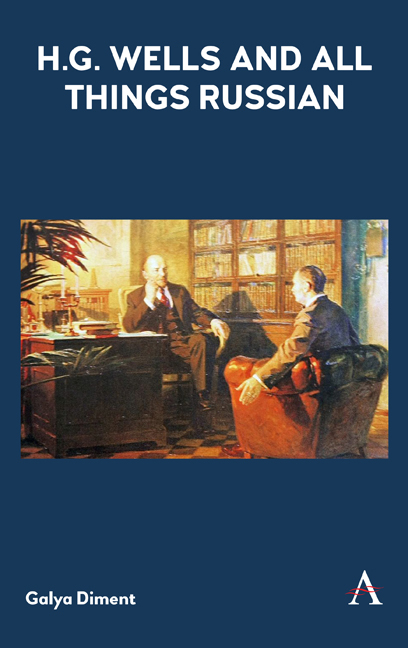Book contents
- Frontmatter
- Dedication
- Contents
- List of Illustrations
- Acknowledgments
- List of Contributors
- A Note on Transliteration
- Introduction: “The Wells Effect”
- Part One WELLS IN RUSSIA: PRE-WORLD WAR II
- Part Two WELLS IN RUSSIA: POST-WORLD WAR II
- Part Three RUSSIA IN WELLS
- Chapter Seven Present Tense Arguments: Russia and H. G. Wells's Babes in the Darkling Wood
- Chapter Eight Wells and Gorky
- Chapter Nine Odette Keun Versus H. G. Wells on Russia
- APPENDIX TRANSLATIONS
- Bibliography
- Wells, Herbert George – Works Index
- General Index
Chapter Nine - Odette Keun Versus H. G. Wells on Russia
from Part Three - RUSSIA IN WELLS
Published online by Cambridge University Press: 06 September 2019
- Frontmatter
- Dedication
- Contents
- List of Illustrations
- Acknowledgments
- List of Contributors
- A Note on Transliteration
- Introduction: “The Wells Effect”
- Part One WELLS IN RUSSIA: PRE-WORLD WAR II
- Part Two WELLS IN RUSSIA: POST-WORLD WAR II
- Part Three RUSSIA IN WELLS
- Chapter Seven Present Tense Arguments: Russia and H. G. Wells's Babes in the Darkling Wood
- Chapter Eight Wells and Gorky
- Chapter Nine Odette Keun Versus H. G. Wells on Russia
- APPENDIX TRANSLATIONS
- Bibliography
- Wells, Herbert George – Works Index
- General Index
Summary
Since so much has been written about Wells's love affairs in both critical and biographical books, the general outline of the Wells– Keun relationship is well known by now. Twentytwo years his junior, Odette Keun was his fan long before they first saw each other, and she apparently even carried a copy of his Outline of History (1920) through her travels in the Caucasus and her imprisonment in Russia. They met in 1924, after Wells broke up with Rebecca West and while his wife, Jane, was still alive. Often, whenever Wells was not in England, they lived together in the South of France, until after a decade, Wells ended the relationship in 1933. Two of Wells's novels are closely associated with her: The World of William Clissold, his longest work of fiction (1926), where Keun, the “self-forgetful friend and helper” to whom the novel is dedicated, had given rise to Clementina, the “Scotch-Greek” love interest of the narrator (Keun was Dutch-French-Italian-Greek); and Apropos of Dolores (1938), written several years after their break-up, where he largely caricatured her.
Less known, especially given the caricature in Dolores, is who Keun really was at the time, aside from one of Wells's longer-lasting partners. In researching the details of her life, I am particularly grateful to Monique Reintjes, who in 2004 published a small volume on her and later communicated to me some additional information and materials, including taped interviews that Wells's biographers, Norman and Jeanne MacKenzie, conducted with Keun for their book and later shared with Reintjes. Reintjes came to develop an interest in Keun by an unusual route, which may surprise those who know of Keun solely through her turbulent relationship with Wells. Reintjes actually first discovered Keun as a writer in her own right: she read Keun's book on Georgia, The Land of the Golden Fleece (1924), and much admired it as a young Russian Studies scholar who herself had spent a year in Georgia in the early 1990s, during yet another civil war there, this time following the fall of the Soviet Union. Wells presumably also read all of Keun's works, as well as had many discussions with her, especially during the earlier and rosier stages of their relationship.
- Type
- Chapter
- Information
- H. G. Wells and All Things Russian , pp. 157 - 172Publisher: Anthem PressPrint publication year: 2019



